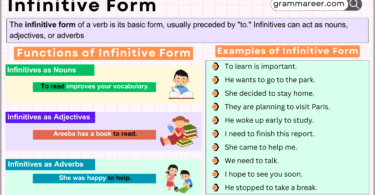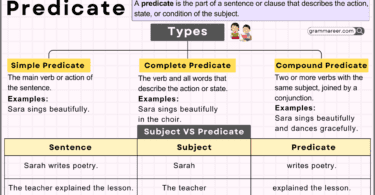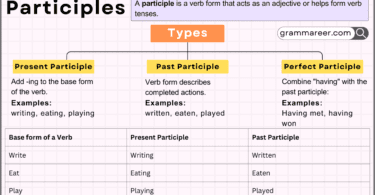Understanding the correct use of “get” and “got” can enhance your proficiency in both spoken and written English. These words are commonly used in everyday language, but the way they are employed can vary based on context and grammatical structure.
Table of Contents
Use of “Get” and “Got” in English
Let’s dive into how “get” and “got” are used in different situations, with particular emphasis on possession, and provide examples in both spoken and written English, including Urdu translations for better understanding.
1. The Use of “Get” and “Got” for Possession
In written English, we typically use “have” to show possession or ownership. However, in spoken English, “get” or “got” is often used interchangeably to indicate possession. Let’s explore both scenarios:
- Written English (I have)
In written formal or standard English, the expression “I have” is used to indicate possession.
Example:
I have a book.
(میرے پاس ایک کتاب ہے۔) - Spoken English (I’ve got)
In everyday spoken English, “I’ve got” is commonly used to express possession. This construction sounds more natural and colloquial.
Example:
I’ve got a dog at home.
(میرے پاس گھر میں ایک کتا ہے۔)
2. Positive Sentences with “Got”
Here are a few examples of how “get” or “got” is used in positive sentences, showing possession:
- I’ve got a dog at home.
(میرے پاس گھر میں ایک کتا ہے۔) - Have you got a servant?
(کیا آپ نے کوئی ملازم رکھا ہے؟) - I’ve got her address.
(میرے پاس اس کا پتہ ہے۔) - I have got plenty of time now.
(میرے پاس اب کافی وقت ہے۔) - How many kids has she got?
(اس کے کتنے بچے ہیں؟)
3. Negative Sentences with “Got”
In negative sentences, we use “haven’t got” or “hasn’t got” to indicate that we do not possess something. This form is very common in casual spoken English.
- I haven’t got any tickets.
(میرے پاس کوئی ٹکٹ نہیں ہے۔) - I haven’t got any time for you.
(میرے پاس آپ کے لیے کوئی ٹائم نہیں ہے۔) - The animal hasn’t got anything to eat.
(جانور کے پاس کھانے کے لیے کچھ نہیں ہے۔) - She hasn’t got anything more to say.
(اس کے پاس کہنے کے لیے مزید کچھ نہیں ہے۔) - He hasn’t got a penny yet.
(اسے ابھی تک ایک پائی بھی نہیں ملی ہے۔)
4. The Use of “Get” for Actions
While “got” is frequently used for possession, “get” itself is often used for actions and transitions. Here, “get” implies receiving or becoming something.
- I get up at 6:00 AM every day.
(میں ہر روز صبح 6 بجے اٹھتا ہوں۔) - She got an award for her performance.
(اس نے اپنی کارکردگی کے لیے انعام حاصل کیا۔)
5. The Difference Between “Have” and “Got”
In formal English, “have” is used to indicate possession. However, in spoken language, “got” is used more commonly. Both convey the same meaning, but there’s a slight difference in their usage based on formality:
- I have a car. (Written)
(میرے پاس ایک کار ہے۔) - I’ve got a car. (Spoken)
(میرے پاس ایک کار ہے۔)
Conclusion
“Get” and “got” are versatile in English. “Got” is used for possession in spoken English, while “get” covers actions and transitions. Knowing when to use “have” vs. “got” helps communicate more naturally. Practice with examples for better fluency.
You May Also Like




